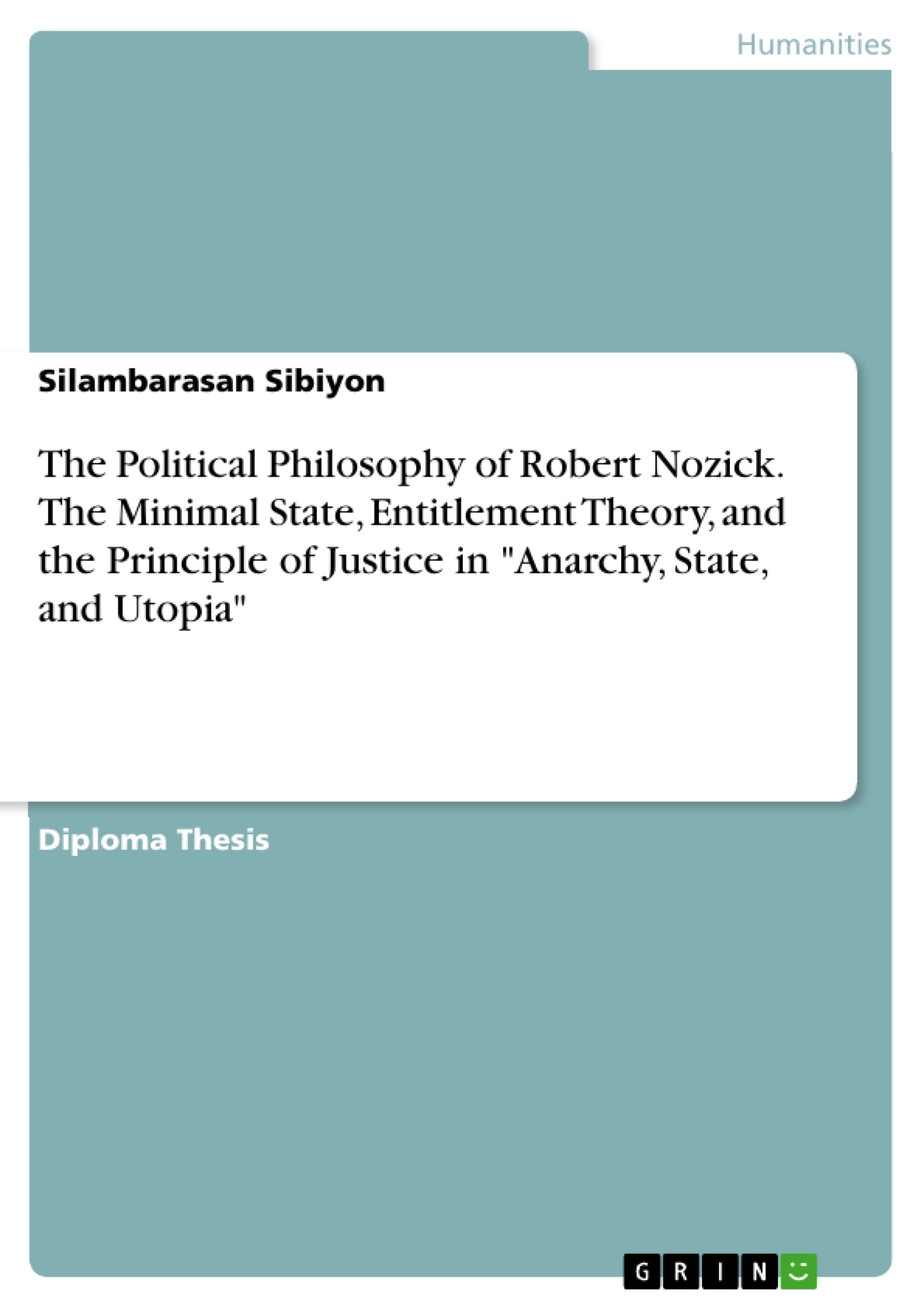This dissertation aims to provide a comprehensive analysis of the political philosophy of Robert Nozick, a prominent figure in contemporary political theory. Nozick's work, particularly his influential book "Anarchy, State, and Utopia" has significantly contributed to the discourse on libertarianism and individual rights. This study critically examines Nozick's key concepts, such as the minimal state, entitlement theory, and the principle of justice in transfer. By delving into his arguments and engaging with relevant scholarly debates, this research seeks to shed light on the strengths and weaknesses of Nozick's political philosophy.
The dissertation employs a multidisciplinary approach that draws upon philosophical analysis, political theory, and legal studies. It begins by providing an overview of Nozick's intellectual background and influences, highlighting his departure from classical liberal thinkers such as John Locke. Subsequently, it explores Nozick's core ideas regarding the role of government in society and his defense of individual rights against redistributive policies.
Furthermore, this study investigates criticisms leveled against Nozick's philosophy from various perspectives. These critiques range from concerns about distributive justice to questions about the feasibility and sustainability of a minimal state. By engaging with these criticisms, this research aims to evaluate the robustness of Nozick's arguments and their implications for contemporary political thought.
In addition to analyzing Nozick's theoretical framework, this dissertation also examines its practical implications. It investigates how Nozick's ideas have influenced public policy debates in areas such as taxation, welfare provision, property rights, and economic inequality. By exploring real-world applications of his philosophy, this research seeks to assess its relevance in addressing pressing social issues.
Ultimately, this dissertation contributes to a deeper understanding of Robert Nozick's political philosophy by critically evaluating its strengths and limitations. By engaging with both supportive arguments and critiques, this research aims to provide a comprehensive analysis that will inform future discussions on libertarianism, individual rights, and the role of the state in contemporary political theory.
Inhaltsverzeichnis (Table of Contents)
- INTRODUCTION.
- Reasons for Choosing the Topic.
- Relevance of the Topic.
- Life and Works of Robert Nozick.
- Acknowledgements
- Structure of the Paper
- THE STATE.
- Nozick's Libertarianism
- Between Anarchy and State.
- The Minimal State
- Protective Associations.
- The Dominant Protective Association
- Is Dominant Protective Association a State?
- Defending the Minimal State.
- The Lockean Predicament.....
- The Invincible Hand Explanation and the Rise of Minimal State
- NOZICK'S THEORY OF RIGHTS.
- Foundation of Nozick's Theory of Rights
- Individual Rights...........
- Inviolable Rights..\li>
- Self Defence and Punishment.
- Distributive Justice and the Minimal State.
- The Entitlement Theory of Justice..\li>
- Justice in Acquisition.....
- Justice in Transfer.
- Rectification of Injustice....
- THE UTOPIA
- The Design Device and the Filter Device
- How Utopia Works Out......
- Utopia and the Minimal State
Zielsetzung und Themenschwerpunkte (Objectives and Key Themes)
This dissertation examines the political philosophy of Robert Nozick, focusing on his concept of the minimal state and its implications for individual rights and social justice. It aims to present a comprehensive overview of Nozick's thought and to analyze its relevance in contemporary society.- The importance of individual rights and their role in shaping political structures.
- The concept of the minimal state and its potential to protect individual freedom and autonomy.
- Nozick's entitlement theory of justice and its implications for distributive justice.
- The relationship between individual rights and social order in Nozick's framework.
- The role of morality in Nozick's political philosophy.
Zusammenfassung der Kapitel (Chapter Summaries)
- Chapter 1: "Introduction" introduces the topic, outlining the reasons for choosing Robert Nozick's political philosophy as the subject of study. It discusses the relevance of Nozick's ideas to contemporary society, highlighting the importance of individual rights in a world grappling with social injustices and the need for a state that respects individual autonomy.
- Chapter 2: "The State" delves into Nozick's libertarianism and his concept of the minimal state. It explores the transition from anarchy to a state and explains how the minimal state arises from the need to protect individual rights through protective associations. The chapter discusses the Lockean predicament and the role of the invincible hand in the emergence of the minimal state.
- Chapter 3: "Nozick's Theory of Rights" focuses on the foundation of Nozick's political philosophy, highlighting the centrality of individual rights. It explores the nature of individual rights, including their inviolability and the importance of self-defense and punishment. The chapter also examines the implications of Nozick's entitlement theory of justice for distributive justice, outlining the principles of justice in acquisition, transfer, and the rectification of injustice.
- Chapter 4: "The Utopia" explores Nozick's vision of a utopian society, which he envisions as a state where individual rights are protected and where a minimal state ensures a framework for social order. The chapter examines the design and filter devices used to achieve this utopia, highlighting how they contribute to a society where individuals are free to pursue their own lives and goals.
Schlüsselwörter (Keywords)
The key themes and concepts in this dissertation are centered around Robert Nozick's political philosophy, focusing on libertarianism, individual rights, the minimal state, the entitlement theory of justice, and the pursuit of utopia.- Quote paper
- Silambarasan Sibiyon (Author), 2023, The Political Philosophy of Robert Nozick. The Minimal State, Entitlement Theory, and the Principle of Justice in "Anarchy, State, and Utopia", Munich, GRIN Verlag, https://www.grin.com/document/1372884




